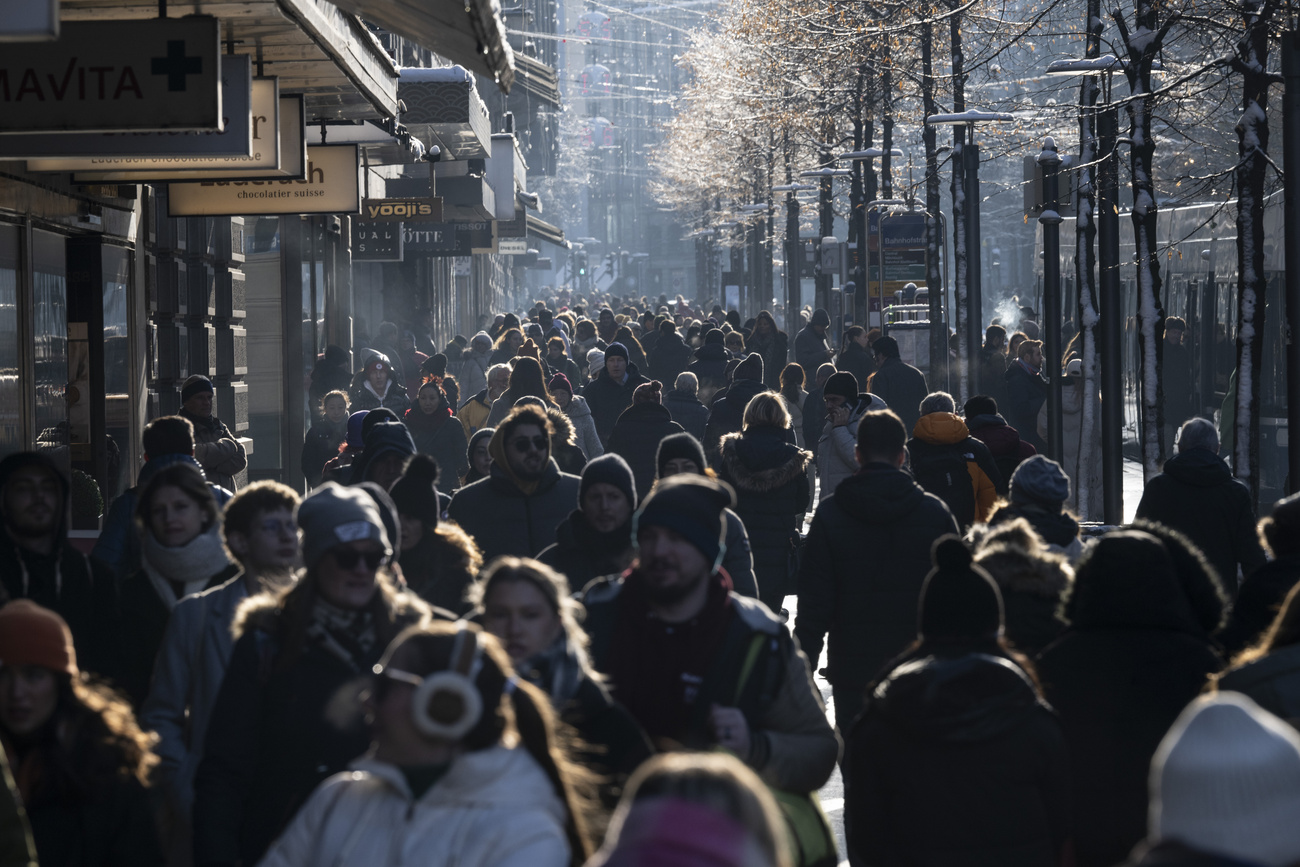
Rediscovering the true meaning of Christmas

Amédée Grab, a long-time defender of Christian values in Switzerland, is retiring as head of the Swiss and European bishops conferences at the end of the year.
In an interview with swissinfo, the bishop of Chur offers his thoughts on the role of the Swiss Catholic church, dialogue with other religions, and the meaning of Christmas.
swissinfo: There has been more dialogue with other religions during your nine years as president of the Swiss Bishops Conference but only limited progress has been made.
Amédée Grab: Ecumenism had a difficult time in 2000 after the Vatican published Dominus Jesus, a statement on the oneness of the Redeemer and the Church, which sparked some controversy. However, since then we have opted for a more pragmatic approach: a common engagement with real life in Switzerland.
This engagement has become more concrete through, among other things, the Swiss Bishops Conference and the Federation of Protestant Churches in Switzerland taking several important joint positions. We have also worked together on charitable actions or in chaplaincies at hospitals, prisons and centres for asylum-seekers.
Furthermore, dialogue has been extended outside Christian churches. This led to the formation of the Swiss Council of Religions last May, which brings together Catholics, Protestants, Jews and Muslims.
swissinfo: The Bishops Conference has also taken a stance on several vote issues. For example, it campaigned unsuccessfully against the tightening of the asylum law in September. Does the church want to have more say on political questions?
A.G.: I don’t think so. However, it has to be said that for decades votes were mostly on economic issues. Over the past few years there have been several votes on more social or scientific issues. Many have had important ethical connotations on which the Catholic and Protestant churches have felt obliged to give their opinion.
swissinfo: The Bishops Conference’s intervention on the asylum issue was criticised, with some insults being directed at you.
A.G.: These types of insults and attacks have been happening for 20 years. But never in my life have I received quite so many insults – not only before the vote but afterwards as well. For some people it wasn’t enough to win, they had to demonstrate their intolerant attitudes to those who lost as well.
swissinfo: One of the main fears seems to be Islam, as we have seen for example through the opposition this year to the construction of minarets in Switzerland. What is your position?
A.G.: Religion can’t be restricted to the private sphere; it also represents a collective reality. It’s not possible for people of different religious convictions to live together if there is no respect for freedom of religion.
We ask for the freedom to build churches and carry out our faith publicly in Muslim countries, which means we should accord this right to Muslims in Switzerland. It’s true that this right is not always granted in the Muslim world, but we can’t expect reciprocal actions if we take this step. Suffering injustices doesn’t mean that we should commit them ourselves.
However, it’s clear that recognising the religious freedom of others should not lead to the denial of our own rights. For example, we shouldn’t accept the denial of our own Christian roots or the imposition of the relationship between religion and state which exists in some Muslim countries, which is not compatible with our concept of freedom and values.
swissinfo: Religion is becoming more important in the Islamic world but is losing ground in the West. Why is that?
A.G.: One of the main reasons is that people have not always been able to bridge the gap between the pace of their intellectual and ethical education and the advances in economics, science and technology. Many people, who either don’t or can’t find time for reflection, often find they are unprepared for such changes.
swissinfo: What does Christmas represent for you?
A.G.: I have the impression that as the opportunities, or the obligation, to have parties and give presents grows, many people are starting to view Christmas as a nuisance. The perception of Christmas has become very problematic and it is often reduced to a meal, presents and a tree.
I would wish for everyone to be able to rediscover the true spark of Christmas, to catch a glimpse of what is behind all this, which is the love of God given to us. By recognising this we also recognise the value of our own existence.
swissinfo-interview: Armando Mombelli
Religions in Switzerland
2000 census and 1970 figures (in brackets)
Catholics: 41.8% (49.4%)
Protestants: 33% (46.4%)
Other Christian communities: 4.4% (1.95%)
Muslims: 4.3% (0.26%)
Jews: 0.25% (0.3%)
Other religions: 0.8% (0.1%)
No religion: 11.1% (1.1%)
No answer: 4.3% (0.4%).
Amédée Grab was born in Zurich and grew up in Geneva. He was ordained a priest in 1954 after studying theology and philosophy at the Benedictine Einsiedeln Abbey.
He rose up the ranks to become bishop of Chur, taking the place of the controversial ultraconservative bishop Wolfgang Haas.
In 1998 he was nominated president of the Swiss Bishops Conference and was chosen to lead the European Bishops Conference in 2001.
Grab will step down from these two posts at the end of 2006. He has asked the Vatican to be relieved of his office as bishop now he has reached the age of 75. He has yet to receive an answer.

In compliance with the JTI standards
More: SWI swissinfo.ch certified by the Journalism Trust Initiative





























You can find an overview of ongoing debates with our journalists here . Please join us!
If you want to start a conversation about a topic raised in this article or want to report factual errors, email us at english@swissinfo.ch.